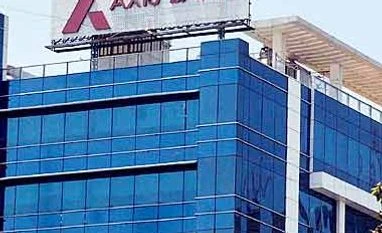Last fortnight’s 13 per cent fall in stock price of Axis Bank has made investors nervous. After hitting a 52-week high of Rs 638 on September 7, it plunged six per cent (one of its steepest fall in recent months) on Friday, pulling down the stock to Rs 557.4 a share.
A strong buzz of Specified Undertaking of the Unit Trust of India (Suuti) dilution at a speculated price of Rs 550-555 during Friday’s trade put pressure on the stock as traders and investors rushed to sell shares. Business Standard could not confirm this.
Market experts were, however, not surprised, saying: “It was in the making, as the stock had reached an uncomfortable valuation zone.” According to them, there could be further fall in the counter before it stabilises at Rs 500-520.
At higher levels, India’s equity fund managers had already turned sellers. During May-August, fund managers liquidated 80 million shares of Axis Bank worth Rs 4,650 crore. The selling intensified during August when the counter hit its one-year high with fund managers selling 60 million shares worth Rs 3,560 crore.
Big fund houses like ICICI Prudential AMC, HDFC Mutual Fund, Reliance Nippon MF, Franklin Templeton and UTI Mutual Fund sold shares of Axis Bank the most.
“Axis is not an exception in the Indian banking sector, which is struggling with bad assets. Given Axis’ exposure in lending to corporate, its high credit costs which could impact its profits, premium being given by the market was obnoxious. Our sell call could be temporary as we may re-consider it if it further falls. Meanwhile, we shifted our focus to banks like HDFC Bank, ICICI Bank and State Bank of India,” said a senior fund manager who kept Axis among his schemes’ top five holdings for long.
Till June of 2016, the private lender was the fifth most sought-after company in Indian fund managers’ overall equity portfolios. With heavy selling, it slipped three notches down to the eighth position as on August 31.
Goldman Sachs recently downgraded Axis Bank from ‘buy’ to ‘neutral’ on account of the sharp run-up in its stock price. “We believe current valuations are fair with likely improvement in operating metrics balancing asset quality risks. We expect credit cost to remain elevated at 1.65 per cent in FY17 before moderating, based on higher stress loan formation at 3.8 per cent versus 3.6 per cent average for peer corporate banks in FY17.”
Analysts at Macquarie, who recently concluded their roadshow on Indian Banks in the US say: “Considering the outperformance of Axis Bank’s stock relative to ICICI Bank over the past six months, there was more interest in ICICI Bank, as investors felt there was still some value left in the stock. The recent IPO of its life insurance business also gives ICICI Bank some ammunition to write-off and, hence, investors said ICICI Bank looked more attractive than Axis Bank”.
Earlier this month, Religare Capital Markets said the risk-reward was favourable for ICICI Bank and upgraded it from ‘sell’ to ‘hold’, while retaining the ‘sell’ on Axis Bank.
A strong buzz of Specified Undertaking of the Unit Trust of India (Suuti) dilution at a speculated price of Rs 550-555 during Friday’s trade put pressure on the stock as traders and investors rushed to sell shares. Business Standard could not confirm this.
Market experts were, however, not surprised, saying: “It was in the making, as the stock had reached an uncomfortable valuation zone.” According to them, there could be further fall in the counter before it stabilises at Rs 500-520.
At higher levels, India’s equity fund managers had already turned sellers. During May-August, fund managers liquidated 80 million shares of Axis Bank worth Rs 4,650 crore. The selling intensified during August when the counter hit its one-year high with fund managers selling 60 million shares worth Rs 3,560 crore.
Big fund houses like ICICI Prudential AMC, HDFC Mutual Fund, Reliance Nippon MF, Franklin Templeton and UTI Mutual Fund sold shares of Axis Bank the most.
“Axis is not an exception in the Indian banking sector, which is struggling with bad assets. Given Axis’ exposure in lending to corporate, its high credit costs which could impact its profits, premium being given by the market was obnoxious. Our sell call could be temporary as we may re-consider it if it further falls. Meanwhile, we shifted our focus to banks like HDFC Bank, ICICI Bank and State Bank of India,” said a senior fund manager who kept Axis among his schemes’ top five holdings for long.
Till June of 2016, the private lender was the fifth most sought-after company in Indian fund managers’ overall equity portfolios. With heavy selling, it slipped three notches down to the eighth position as on August 31.
Goldman Sachs recently downgraded Axis Bank from ‘buy’ to ‘neutral’ on account of the sharp run-up in its stock price. “We believe current valuations are fair with likely improvement in operating metrics balancing asset quality risks. We expect credit cost to remain elevated at 1.65 per cent in FY17 before moderating, based on higher stress loan formation at 3.8 per cent versus 3.6 per cent average for peer corporate banks in FY17.”
Analysts at Macquarie, who recently concluded their roadshow on Indian Banks in the US say: “Considering the outperformance of Axis Bank’s stock relative to ICICI Bank over the past six months, there was more interest in ICICI Bank, as investors felt there was still some value left in the stock. The recent IPO of its life insurance business also gives ICICI Bank some ammunition to write-off and, hence, investors said ICICI Bank looked more attractive than Axis Bank”.
Earlier this month, Religare Capital Markets said the risk-reward was favourable for ICICI Bank and upgraded it from ‘sell’ to ‘hold’, while retaining the ‘sell’ on Axis Bank.
)